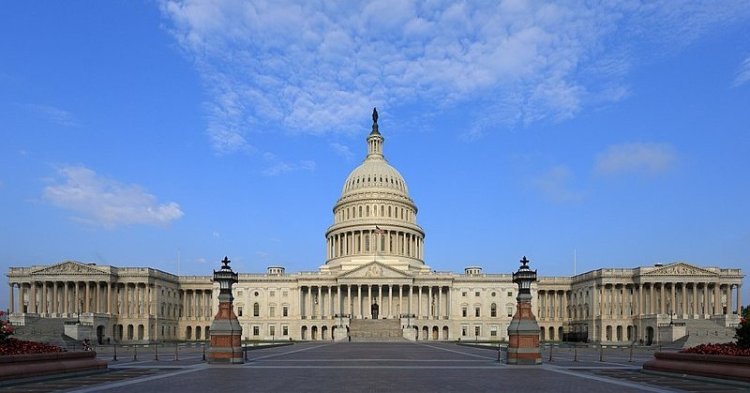The President of the United States – the commander-in-chief of the world’s superpower-in-chief – has for weeks refused to acknowledge his electoral defeat and sought to manoeuvre his way out of it by inciting electoral fraud and vote tampering, encouraging the country to believe his own delusions of grandeur and landslide victory, urging his hardcore supporters to help him in restoring the rightful at the helm – that being none other than himself, of course.
Attack on the Capitol
Hardly surprising, then, that thousands of US citizens would listen to his call. It’s early-afternoon on the East Coast, European families are enjoying dinner after a long remote-working or remote-schooling day. US Senators and Representatives have begun certifying the election of Joe Biden as President of the United States of America. As is many times the case, reality irrupts through breaking news, dressed in the colourful apparels of American cable TV, yet no less discomforting. The Capitol Building, seat of the US Congress, is under siege.
If you were following the incursion of the Capitol Building as it happened, you’d be excused for being somewhat confused by the parade of buffalo hats, MAGA merch and confederate flags. The saying goes that «all great world-historic facts and personages appear, so to speak, twice … the first time as tragedy, the second time as farce»[1]. What the saying doesn’t add is: «and the third time, as a meme». Surrealism aside, the siege of the Capitol did not materialise out of thin air. It is the direct result of decades of political polarisation, of mainstream political parties enabling the far right for short-term electoral gain, and of growing distrust in democratic institutions. None of the above is confined to the United States, and it bears value to reflect on those happenings – and chiefly, the appropriate response to them – also with regard to the European domestic political landscape.
The full extent of the law
First, it must be clear that Donald Trump, who is still President of the United States for another week or so, bears the political and, ostensibly, legal responsibility for what happened in Capitol Hill. He has been entertaining an unfounded and distorted narrative concerning the electoral results, which he has weaponised to undermine US constitutional principles, further inciting his supporters to stop Congress from carrying out its duties. Secondly, rioters have in fact engaged in criminal behaviour, such as breaking and entering into the Capitol Building and the offices of elected representatives.
Thence the question: shall this behaviour be prosecuted «to the fullest extent of the law»[2]? The short answer is yes. The most basic principle of the “physics” of communities of law is that actions have consequences. For the rule of law to stand as the foundation of democratic systems, there can be no doubt about the certitude of punishment.
The limits of the law
The emphasis, nonetheless, is on certitude, not effect. This is to say that, however harsh, the punishment itself is powerless in restoring trust in democratic systems and salvaging those that have ceased to feel part of democratic societies. Just think of whether the death penalty (a fixture of the US justice system that casts a dark shadow over the country’s democratic credentials) has duly performed its task of deterring violent crimes. Or whether, closer to home, the legal cases mounted against Silvio Berlusconi, former Italian Prime Minister, many of them successful in courts of law, achieved much in the “court of the people” towards denting his political support and his personalistic governing of the country in the 2000s. One can’t be blind to the fact that the law, the constitutional orders, just like currencies and much of the institutions established to preserve democratic systems and civic-political rights, rely on fickle consensus. Case in point, the alleged sympathy of some in the Capitol Police force towards the rioters. In other words, the law is meaningless if no one trusts the law.
Transatlantic ties
The truth is that the West has been experiencing, for decades now, growing discomfort with and opposition to representative democracy, the rights of minorities and the rule of law itself, multilateral institutions – you name it. Underpinning the slow degradation of the Western liberal order is an inability to understand and accept complexity, recognise disagreements and political confrontation as an essential part of democratic debate, and, finally, to top it all up, the consistent efforts at dehumanising political opponents, in a struggle to be ever more «woke» or «patriotic».
Within that liberal order, Europe has always felt and behaved as the lesser sibling to American democracy, idealising its qualities, all the while incapable of both assessing its faults and becoming the mature political union it is supposed to be. To a large extent, this might be due to heavy reliance in the post-war period on the military-security shield of the transatlantic superpower. A lack of «strategic autonomy» on the part of Europe meant that, for the better part of the twentieth century, the EU would more often than not align politically with the US, as well.
What would we say, however, were a European country - case in point, Belarus - to apply the death penalty, whose judges and public prosecutors are nominated through political-electoral bargaining, where the second-in-command in the executive branch chairs one of two legislative chambers (arguably the most influential), up to actually breaking vote ties, and where the provision of information is concentrated in the hands of private media super-conglomerates?
A cautionary tale
Early media commentary on the Capitol riots rushed to acknowledge that «Trump was a symptom not the cause of something badly broken in America, and that the bigger worry was not the outgoing president but his tens of millions of supporters who aren’t going anywhere». Trump’s electorate surely has a responsibility for having put an authoritarian in the highest office in the land, but it’s a rather easy way to avoid naming those who share equal, if not more severe responsibilities.
In the face of intense technological change, swathes of people have been made redundant in their jobs, and the political class has chosen to ignore that fact and shifted responsibility to trade integration (AKA globalisation) or migrants, sowing growing resentment. Education systems across Western democracies have been increasingly twisted towards hard measurable – and marketable – competences, discarding informal and soft skills such as mutual understanding, critical sense, or even mere reading-comprehension abilities. Mainstream parties and politicians have enabled and co-opted far-right anti-democratic ideas, chiefly so the US Republican Party.
Last, but not least, “fake news” is anything but a recent invention: as far back as 2004, an anonymous aide to then President George W. Bush was quoted as saying «when we act, we create our own reality». Trump was just more successful than others at making all of the above an effective electoral tool. The cautionary tale is that he may have lost this election, but there are plenty of wannabe authoritarians just waiting to pick up where he left off.
Restoring democratic institutions
From an institutional perspective, the lesson we should learn from the US is one of distribution of power. What renders a full authoritarian takeover of the United States more difficult – although not completely impossible – is its federal structure. The federal, state and local levels of government in the US all have their own governments and legislatures, their own police and/or military forces. Federal structures create intersections of powers that stand in the way of any single individual’s ability to overthrow democracy. It takes, therefore, a concerted and systemic effort to succumb again to the totalitarian regimes Europe experienced in the 1930s.
In contrast, Europe – more specifically, the European Union – has repeatedly run into walls in the attempt to restore the rule of law and a democratic system worth its name in some of its Member States. It is a lack of competences and power, coupled with deliberate efforts to stifle the construction of a European polity, which increase the pressures against democracy in Europe.
As the consequences of the Capitol siege unfold on the other side of the Atlantic, we must – as European federalists and radical democrats – continue our fight to build institutions that embody the safeguards to our rights and values as active citizens. Pledge in favour of the intersections of power of federal systems, as they can provide the best safeguard against authoritarian takeovers. Defend the slow pace of political debate, as it can provide the time to build consensus and combat political polarisation. Not a carbon-copy of American federalism, but a system inspired by it. A federal system grounded in multilingualism, in a social market economy that leaves no one behind, in representative democracy and the freedom to take part in it.


Follow the comments: |
|
